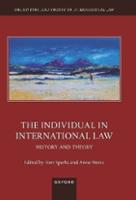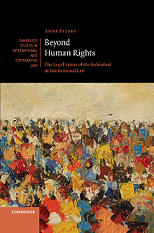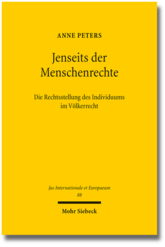Has a paradigm change occurred which makes humans, normatively speaking, primary international legal persons? Starting point of the research is the observation that more and more international legal norms directly address human beings. Therefore, we must, first, examine in a systematic fashion whether and which substantive rights and obligations of individuals derive directly from international law, and whether procedural mechanisms for enforcing them have really increased in the last decades. Second, we need to find out whether the presumed quantitative development also has a qualitative significance.
It is suggested that a qualitative change is taking place, or has taken place, and that this change can be best observed and assessed by using a novel concept: the international individual right. This concept captures the new legal status of the individual, and also implies that individual international rights can be divided into human rights and “ordinary” international rights. A distinction between these two sub-groups is technically feasible, analytically convincing and normatively appropriate.
Related publication: Anne Peters, The Importance of Having Rights, Zeitschrift für ausländisches öffentliches Recht und Völkerrecht/Heidelberg Journal of International Law 81, 7-22 (2021). doi: 10.17104/0044-2348-2021-1-7.
See also the project: The Individual in International Law - History and Theory
Anne Peters and Tom Sparks (eds), The Individual in International Law: History and Theory (Oxford University Press 2024).

When ascribing individual rights, there is a difference between legal rules which embody “objective” standards of protection that impose obligations or duties on obligors, and rules which additionally confer “subjective” rights on those persons whom the rules seek to protect. In this chapter, Anne Peters examines whether, and under what conditions, international humanitarian law (IHL) generates such individual rights, and against whom. Since case law has yet to settle which rules in IHL actually generate individual rights, this must be determined in each case by interpreting the provisions or by clarifying the content of the underlying norm of customary law. Therefore, further study must identify how to recognise an individual IHL-based right and which types of rights exist. In doing so, Peters concludes that the acknowledgment of IHL-based rights endorses the individual human being as the normative reference point of IHL. Thus, Peters asserts that the individualisation of IHL has not reached its limits. The principal modern purpose of IHL – to protect humans from the calamities of war –, is best pursued by acknowledging direct IHL-based, special individual rights, rather than falling in the two extremes: Either applying human rights across the board or denying individual rights altogether.
Publication in:
Jennifer Welsh, Dapo Akande and David Rodin (eds), The Individualization of War: Rights, Liability, and Accountability in Contemporary Armed Conflict (Oxford University Press 2023).
Related publication:
Anne Peters, “Rights to Reparation as a Consequence of Direct Rights under International Humanitarian Law”, Zeitschrift für ausländisches öffentliches Recht und Völkerrecht/Heidelberg Journal of International Law 78 (2018), 545-549. "Rights to Reparation as a Consequence of Direct Rights under International Humanitarian Law"
The recent deliberate legal-political strategy of individualising the systemic problem of corruption bears risks and opportunities. Correlations between the quantity and quality of corruption on the one side and the level of enjoyment of human rights on the other side have been shown. In response to these observations, the policy agendas of anti-corruption and human rights have been converging on the international and regional levels. Nevertheless, it is not easy to conceptualise corruption as a human rights violation that triggers international state responsibility. Moreover, risks and opportunities of the convergence of the policy agendas need to be assessed. This leads to the conclusion that the human rights approach does convey an added value that outweighs its drawbacks. The question remains whether human rights are the proper normative framework to denounce and combat corruption. It is submitted that, by opening up new options for monitoring and litigation, the human rights perspective can usefully complement the criminal law approach. Therefore, the currently one-sided integration of corruption concerns into the human rights machinery should be supplemented by a full attention to human rights in all monitoring schemes in the various anti-corruption regimes. Then, the relevant policies will likely create a positive feedback loop in which anti-corruption is instrumental to improving the human rights situation while a range of human rights will work as enablers for fighting corruption.
Publications:
Anne Peters, “Human Rights and Corruption: Problems and Potential of Individualising a Systemic Problem”, MPIL Research Paper Series No. 2023-18, 28 August 2023. “Human Rights and Corruption: Problems and Potential of Individualising a Systemic Problem”
Anne Peters, “Corruption as a Violation of International Human Rights“, European Journal of International Law 29 (2018), 1251-1287.
The UN Agenda 2030 (adopted in 2015) is a marker for a new era of international law, an era of globalisation fatigue. Critique against the political and economic liberalism or even neo-liberalism of the international legal order and the neglect of the social (welfare) dimension in international legal regimes, procedures, and institutions is getting louder. The project examines various trends which point towards the emergence of a “more social” international law: The international anti-poverty regime, new standard procedures such as social impact assessments, and the rise of social rights. The common feature of these new or strengthened legal concepts, legal subfields, and procedures is the acknowledgment of a cross-border responsibility for the welfare of individuals.
The project assesses these trends through the lens of global constitutionalism. By absorbing the social question, global constitutionalism can mitigate its neo-liberal tilt, and would be rescued from being reduced to a project to deepen the power of capital and to extend a market civilization in which the transnational investor is the principal political subject.
Publications and Presentations:
Anne Peters, “Global Constitutionalism: The Social Dimension”, presentation at the Edinburgh Centre for International and Global Law, Edinburgh, 13 February 2020. Presentation
Anne Peters, “Global Constitutionalism: The Social Dimension”, in: Takao Suami/Anne Peters/Dimitri Vanoverbeke/Mattias Kumm (eds), Global Constitutionalism from European and East Asian Perspectives (Cambridge: Cambridge University Press 2018), 277-350.
Of possible further interest the project: Global Constitutionalism and Global Challenges

Anne Peters, Beyond Human Rights – The Legal Status of the Individual in International Law.
Translated by Jonathan Huston, revised and updated by the author, Cambridge University Press 2016, 602 p.
Chapter Abstracts

Anne Peters, Jenseits der Menschenrechte: Die Rechtsstellung des Individuums im Völkerrecht (Tübingen: Mohr Siebeck 2014).
English translation: Beyond Human Rights, Cambridge University Press 2016.
The argument of this study is that a paradigm change is occurring in the course of which human beings are becoming the primary international legal persons. This argument is unfolded against the background of historical concepts and doctrines about the status of the individual under international law. It is notably based on the practice in numerous areas of public international law, ranging from the law of international responsibility over the law of armed conflict, the law of humanitarian assistance, international criminal law, international environmental law, the law of consular relations and the law of diplomatic protection, international labour law, and refugee law, up to international investment law. In these fields, substantive rights and obligations of individuals arguably flow directly from international law, and in some instances procedural mechanisms for enforcing them exist. All this manifests an international legal personality of individuals which is based on customary law, which constitutes a general principle and which can be derived from the human right to legal personality. The emergence of “ordinary” international rights as opposed to human rights sharpens the so-far hardly perceptible normative hierarchy in international law. The novel legal status of humans in international law is captured with a concept borrowed from constitutional doctrine: international rights of the person, as opposed to international law protecting persons.
Anne Peters/ Tilmann Altwicker, “Kapitel 21: Das Diskriminierungsverbot“ [comparative commentary of article 14 ECHR/article 3 para. 2 and 3 German Constitution], in: Oliver Dörr/Rainer Grote/Thilo Marauhn (eds), Konkordanzkommentar EMRK/GG, Vol. II (Tübingen: Mohr Siebeck 3nd ed. (in preparation).
Anne Peters/ Tilmann Altwicker, “§ 13: Die Verfahren beim EGMR”, in: Stefan Leible/Jörg Philipp Terhechte (eds), Europäisches Rechtsschutz- und Verfahrensrecht (Enzyklopädie Europarecht Vol. 3, Baden-Baden: Nomos 2d ed.), 403-429.
Anne Peters: Privacy, Rechtsstaatlichkeit, and the Legal Limits on Extraterritorial Surveillance. In: Privacy and Power - A Transatlantic Dialogue in the Shadow of the NSA-Affair, Russell A. Miller (Hrsg.). CUP, Cambridge 2017, 145-179.
Anne Peters, Simple international rights, global constitutionalism, and scholarly methods - A rejoinder to comments on "Beyond Human Rights", 3 February 2016, Völkerrechtsblog.
Anne Peters, Corruption as a Violation of Human Rights.
Anne Peters, Der Mensch im Mittelpunkt des Völkerrechts, in: Rechtswege. Kontextsensible Rechtswissenschaft vor der transnationalen Herausforderung, Dieter Grimm, Alexandra Kemmerer, Christoph Möllers (eds.), Recht im Kontext vol. 2. Nomos, Baden-Baden 2015, 63-77.
Anne Peters, Surveillance without Borders? The Unlawfulness of the NSA-Panopticon, EJIL Talk! Blog of the European Journal of International Law, 1 November 2013.
Anne Peters, Human Rights à la Chinoise: Impressions from the 6th Human Rights Forum in Beijing on the Eve of the Second UPR of China, EJIL Talk! Blog of the European Journal of International Law, 23 September 2013.
Anne Peters/Tilmann Altwicker, Europäische Menschenrechtskonvention: Mit rechtsvergleichenden Bezügen zum deutschen Grundgesetz, (München: C.H. Beck 2nd ed. 2012), 316.
“Global Rights. Animal Rights.”, Keynote Lecture at the Max Planck Law Annual Confernce (online), 28 October 2020.
The 11th Frankfurt Lecture: “Rechte, Pflichten und Verantwortung in der posthumanistischen Konstellation“ [„Rights, duties and responsibility in the post-humanist constellation“], Goethe University Frankfurt, Frankfurt/Main,
Part I: "Pflichten, Verantowrtung und künstliche Intelligenz", 5 November 2019.
Part II: “Rechte der Tiere und der Natur“, 4 November 2019.
Die Grenzen zwischen Tier, Mensch und Maschine verschwimmen zunehmend. Auch der Vorrang des Menschen, der im Begriff ist, den Planeten zu zerstören, wird hinterfragt. Ist es in dieser Konstellation sinnvoll und geboten, Tieren, Bergen, Flüssen und Wäldern Rechte zuzusprechen, wie Gerichte in Lateinamerika und Indien es tun? Was sind die praktischen Konsequenzen für unseren Umgang mit der Natur und mit Tieren, insbesondere jenen, die wir milliardenfach ausbeuten und töten? Sollten wir auf der anderen Seite, intelligenten Maschinen Rechtspflichten auferlegen? Könnte sich eine unbemannte Drohne selbst strafbar machen, wenn sie das humanitäre Völkerrecht verletzt? Müssen wir eine neue Rechtsgemeinschaft gründen, in der Menschen, Tiere und Cyborgs Platz haben?
Der internationale Menschenrechtsschutz im Gegenwind, lecture by Prof. Dr. Anne Peters as part of the Studium Generale of the University of Heidelberg, 26 June 2017.
Korruption und Menschenrechte, Inaugural Lecture of Prof. Dr. Anne Peters as Honoary Professor at the Faculty of Law of the University of Heidelberg, Aula of the Alte Universität Heidelberg, 10 June 2015.
Katja Gelinsky, Mensch im Völkerrecht: Auf dem Weg zum globalen citoyen?, Frankfurter Allgemeine Zeitung, 17 May 2013, 7.